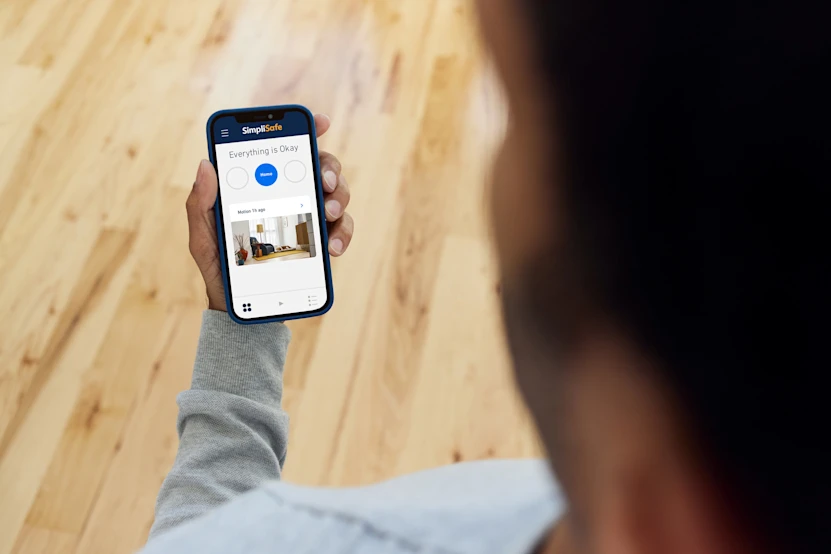Choosing a Safe Word & Other Aspects of Professional Monitoring
Posted April 29th, 2024 by SimpliSafe

Do-it-yourself or DIY smart home security systems offer a lot of flexibility both in terms of budget and customization abilities. However, opting for this type of security system instead of a traditional hardwired system often leaves homeowners with a few lingering questions. For instance, can you still get professional monitoring with a DIY system? Is professional monitoring even necessary? How will a professional monitoring agent know if it’s me they’re speaking with or a bad actor?
In short, professional monitoring is an excellent way to enhance your personal safety. Here’s what you need to know to get started:
What is Professional Monitoring?
Professional monitoring is an added and option benefit that ensures the authorities will be alerted in the event that an alarm is triggered. Whether you’re at home or away, you can have peace of mind knowing that the police and other emergency responders will be dispatched in the case of a break-in or fire, or other emergency. It’s a great addition to any smart home security system because although you can self-monitor, some events require fast and expert attention.
The Difference Between Self-Monitoring and Professional Monitoring
Most smart home security systems, SimpliSafe included, give you the option to self-monitor. Whether it’s checking footage from your outdoor security camera, or getting notified when someone’s at your door from your smart lock or video doorbell, these systems send you app alerts of alarm events and record video footage that you can review.
The difference between self-monitoring and professional monitoring, though, is your connection to emergency authorities. With self-monitoring, it is on the homeowner to call the authorities during an emergency. With professional monitoring, if an emergency were to occur and your alarm to sound, the authorities will be alerted right away and send the appropriate if necessary, even if you are away from home or unable to check your smart home security app.
When to Use Professional Monitoring
So, when should someone stick with self-monitoring, and when should they invest in professional monitoring?
Here are some examples of when self-monitoring is all you need:
To know when your kids are getting home from school
To check who is at the door before letting someone in
To catch the occasional porch pirate
To know when the temperature drops too low in your home
Here are some examples of when professional monitoring is necessary:
You don’t like or have the ability to check your phone often enough to make self-monitoring a reliable safety option
If you often find yourself without WiFi or an internet connection, and you want to ensure the authorities are able to monitor and address any home emergencies
You’re at home, but you want to have an extra layer of security if there were to be an emergency
You want to make sure the fire department will come right away if smoke is detected
Features of Professional Monitoring
The main goal of professional monitoring is to quickly dispatch the authorities in the event of an emergency. Generally, professional monitoring works as follows:
An intruder trips a sensor
You get notified by the professional monitoring center
If you don’t answer the phone or consent to have action taken to protect your home, the monitoring center will contact 911 and relay any relevant information they were able to obtain through sensors and cameras
911 will dispatch the appropriate emergency authorities so you can get the help you need fast
Additionally, there are other features included. For example, at SimpliSafe, our various professional monitoring systems include:
Smart home integrations
Alarm alerts for specific people
Special PINS for guests
& more
Choosing a Safe Word: How Does it Work?
At Simplisafe, you are required to choose a safe word when you set up professional monitoring for your system. A safe word is a safety precaution that helps us at SimpliSafe verify it’s you and not a bad actor impersonating you, trying to gain access to your system, disarm your system, or access your account. This is in addition to a master PIN which is needed to access the keypad’s menu and disarm your system.
After all, a clever burglar may find that hacking your PIN safe or word might be the simplest way to gain access to your home.
So, how do you choose a good safe word? Here are some tips:
Avoid using the names of relatives or people in your household and obvious phrases such as your home address
Don’t use anything that might be difficult for a professional to pronounce or understand. This may seem ambiguous, but if the way you pronounce a word might be different than how someone else reads it, you could be in trouble if there’s a real emergency
Consider changing your safe word every so often
If you forget it, know how to reset your safe word.
Is Professional Monitoring Right For Me?
Ultimately, it’s up to you to decide whether or not professional monitoring is right for you. But, for most people, the benefits outweigh the added cost. Self-monitoring can only take you so far, whereas professional monitoring is the best way to ensure that the authorities will be notified, even if you’re not able to get to the phone to address the alert.
Here at SimpliSafe, we want you to feel as secure as you can. Take a look at our professional monitoring features to learn more.